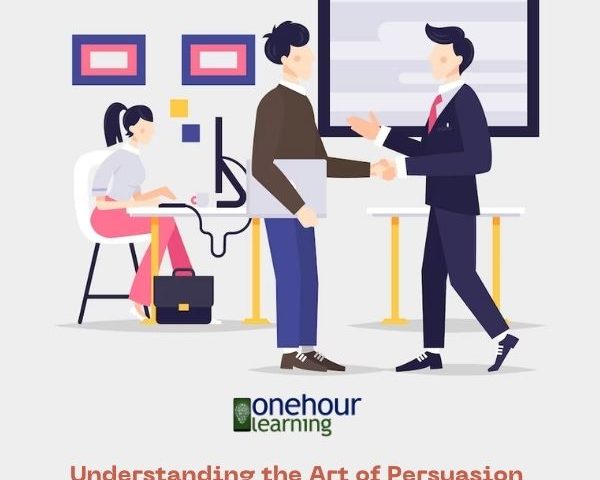Selling Skills 101: Understanding the Art of Persuasion in Sales

Boosting Your Career with Advanced Selling Skills
July 15, 2023
Unlocking Potential: Why Behavioural Courses Matter
July 17, 2023Introduction
In the competitive world of sales, mastering the art of persuasion is crucial for success. Whether you’re a sales professional or just starting your journey, developing effective selling skills is a must. In this blog post, we will delve into the intricacies of the art of persuasion in sales, exploring various techniques, strategies, and tactics that can help you influence customers and boost your sales. So, let’s begin our journey of discovering the key elements of selling skills 101.
The Power of Persuasion in Sales
Persuasion lies at the heart of successful sales. It is the ability to influence potential customers, understand their needs, and present your products or services in a compelling manner. The art of persuasion in sales goes beyond simply convincing someone to make a purchase; it involves building trust, establishing rapport, and creating long-lasting relationships.
Selling Methods for Effective Persuasion
To become a persuasive salesperson, you need to master a range of sales techniques. These techniques not only enhance your persuasive abilities but also provide a framework for structuring your sales conversations. Some effective selling techniques to consider include:
- Building Rapport: Developing a genuine connection with your prospects is essential for effective persuasion. By actively listening, empathizing, and finding common ground, you can establish trust and make your customers more receptive to your message.
- Asking Powerful Questions: By asking insightful questions, you can uncover your customers’ pain points, motivations, and desires. This information allows you to tailor your sales pitch and position your product or service as the solution they need.
- Storytelling: Humans are wired to respond to stories. Utilize the power of storytelling to engage your prospects emotionally and illustrate the benefits and value of your offering. Craft compelling narratives that resonate with your target audience.
Persuasive selling methods
While individual techniques are important, a comprehensive selling strategy is crucial for consistent success in sales. Here are some effective selling strategies that encompass the art of persuasion:
- Solution Selling: Position your product or service as a solution to your customer’s problems. Understand their pain points, highlight the benefits your offering provides, and demonstrate how it can address their specific needs.
- Consultative Selling: Adopt a consultative approach by acting as a trusted advisor rather than a pushy salesperson. Ask probing questions, actively listen to your customer’s concerns, and provide tailored recommendations based on their unique circumstances.
- Social Proof and Testimonials: Leverage the power of social proof by sharing success stories, testimonials, and case studies. When potential customers see how your offering has benefited others, they are more likely to trust your claims and make a purchase.
Mastering Sales Negotiation Tactics
Negotiation is an integral part of the sales process. Being skilled in negotiation tactics can help you navigate objections, reach mutually beneficial agreements, and close deals. Some effective negotiation tactics include:
- Active Listening: During negotiations, carefully listen to your customers’ concerns, objections, and desired outcomes. By understanding their perspective, you can find common ground and propose win-win solutions.
- Framing and Anchoring: Set the context and frame the negotiation in a positive light. Use anchoring techniques by starting with an ambitious offer or presenting high-value options first. This can influence the perception of value and increase the likelihood of a favorable outcome.
- Creating Urgency: Encourage action by creating a sense of urgency. Highlight limited-time offers, exclusive deals, or time-bound benefits to motivate customers to make a purchase decision promptly.
Influencing Customers in Sales
At its core, the art of persuasion in sales is about influencing customers to take the desired action. To maximize your influence, consider the following:
- Emotional Appeals: Appeal to your customer’s emotions by tapping into their desires, aspirations, and pain points. Craft your messaging in a way that resonates with their emotions and creates a sense of urgency or excitement.
- Building Credibility: Establish your credibility as an industry expert through thought leadership, certifications, testimonials, and success stories. Customers are more likely to trust and be influenced by individuals or businesses they perceive as knowledgeable and trustworthy.
- Continuous Learning and Adaptation: The world of sales is ever-evolving, and it’s essential to stay updated with the latest trends, techniques, and tools. Invest in continuous learning to sharpen your skills and adapt your approach to changing customer behaviors and market dynamics.
Conclusion
Mastering the art of persuasion in sales is a lifelong journey that requires continuous learning, practice, and refinement. By implementing effective selling techniques, strategies, and negotiation tactics, and by understanding the psychology of influencing customers, you can elevate your selling skills to new heights. Remember, persuasion in sales is not about manipulation but about building relationships, solving problems, and delivering value. So, embrace the art of persuasion and unlock your potential for sales success.




